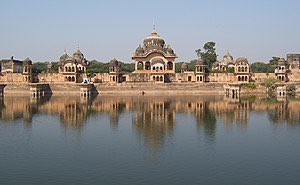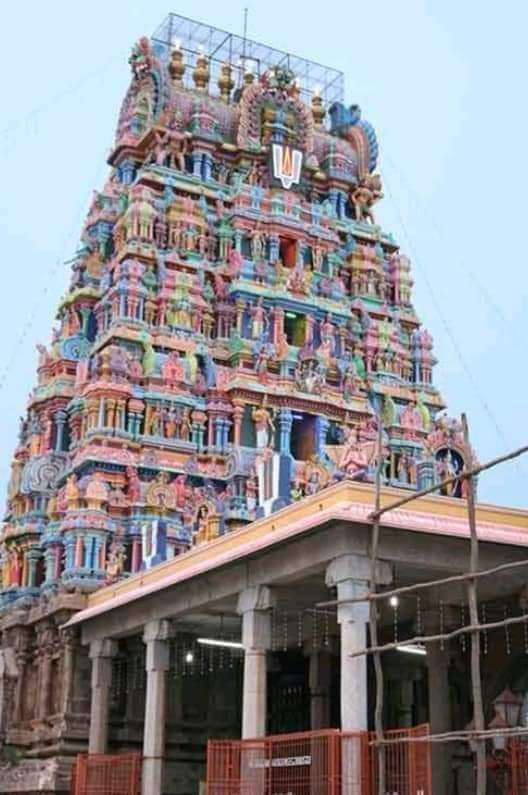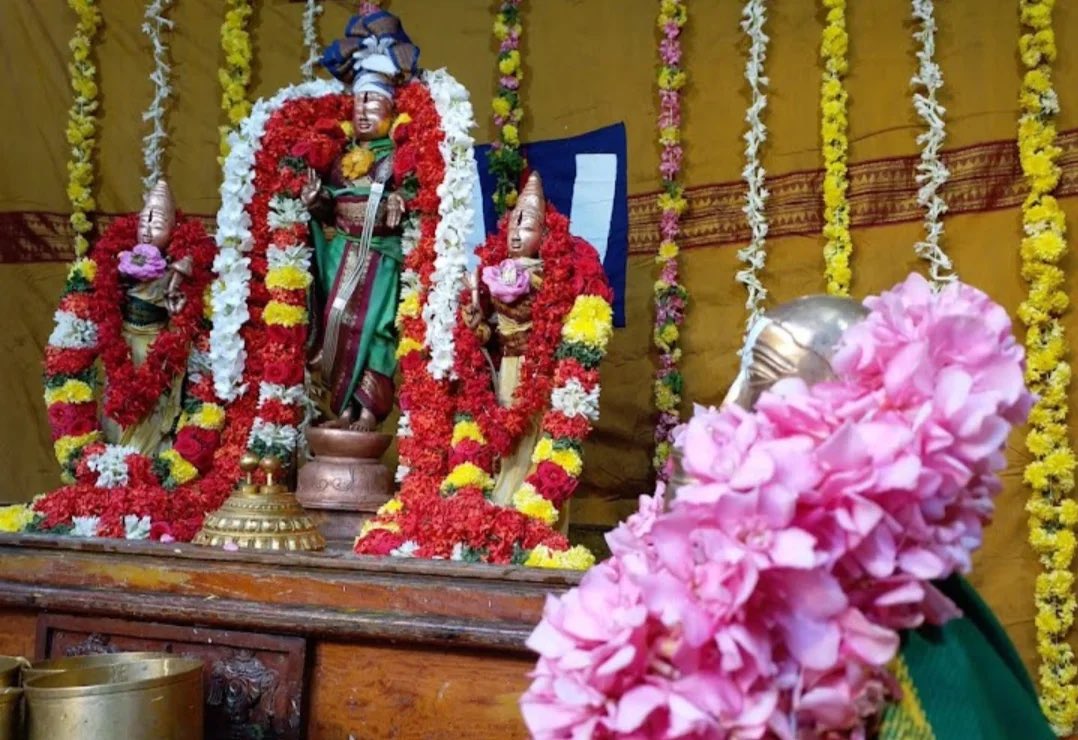#கோவர்தன_கிரிவலம் கோவர்தன கிருவலம் மேற்கொள்வதன் மூலம் ஸ்ரீ கிருஷ்ணர் மீதான அன்பை வளர்த்துக் கொள்ள முடியும். திருவண்ணாமலை கிரி வலம் போல கோவர்தன கிரிவலம் வடநட்டில் மிகப் பிரபலம். மலையையே கிருஷ்ணனாக பாவித்து கிரிவலம் வருவது இங்கு போல் அங்கும் வழக்கமாக உள்ளது. கோவர்தன கிரிவலம் 

26 கி.மீ. பாதையைக் கொண்டது. ரூப கோஸ்வாமியின் கூற்றின்படி கோவர்தன மலையை வலம் வர விரும்புபவர்கள், முதலில் மானஸ கங்கையில் நீராடி பின்னர், அருகில் இருக்கும் ஹரிதேவரை தரிசித்த பின்னரே, கிரிவலத்தைத் தொடங்க வேண்டும்.
மானஸ கங்கை: கிரிவலத்தை இவ்விடத்தில் தொடங்கி இறுதியில் இங்கேயே முடிக்க
மானஸ கங்கை: கிரிவலத்தை இவ்விடத்தில் தொடங்கி இறுதியில் இங்கேயே முடிக்க

வேண்டும். கிருஷ்ணர் தனது மனத்தாலேயே கங்கையை அங்கு வரவழைத்தார். அதனால் அந்த கங்கை, மானஸ கங்கை என்று பெயர் பெற்றது.
ஹரிதேவரின் கோயில்: கிருஷ்ணர் இங்கு நாராயண ரூபத்தில் வீற்றிருக்கின்றார். கோவர்தன மலையை தூக்கியவரும் இவரே.
சகலேஸ்வர மஹாதேவர்: ஸநாதன கோஸ்வாமியின் பஜனை குடிலுக்கு
ஹரிதேவரின் கோயில்: கிருஷ்ணர் இங்கு நாராயண ரூபத்தில் வீற்றிருக்கின்றார். கோவர்தன மலையை தூக்கியவரும் இவரே.
சகலேஸ்வர மஹாதேவர்: ஸநாதன கோஸ்வாமியின் பஜனை குடிலுக்கு

அருகில் சகலேஸ்வர மஹாதேவர் என்று அழைக்கப்படும் சிவாலயம் அமைந்துள்ளது. விருந்தாவனத்தின் பிரதான பஞ்ச சிவலிங்கங்களில் இதுவும் ஒன்று.
லக்ஷ்மி நாராயண கோயில்: ஆழ்வார்களால் பாடப்பெற்ற 108 திவ்ய தேச கோயில்களில் இதுவும் ஒன்றாகும். இக்கோயில் இருக்கும் விக்ரஹங்கள் கோவர்தன மலையின் உற்சவ
லக்ஷ்மி நாராயண கோயில்: ஆழ்வார்களால் பாடப்பெற்ற 108 திவ்ய தேச கோயில்களில் இதுவும் ஒன்றாகும். இக்கோயில் இருக்கும் விக்ரஹங்கள் கோவர்தன மலையின் உற்சவ

விக்ரஹங்களாக கருதப்படுகின்றனர்.
அனியோர்: சமோசா, கச்சோரி, சாதம், பூரி, இனிப்பு, காய்கறிகள், பால் பதார்த்தங்களை மலைபோல அமைத்து கோவர்தன மலைக்கு அன்னப் படையல் அர்ப்பணிக்கப் பட்ட இடம். இது அன்னகூட க்ஷேத்திரம் என்றும் அறியப்படுகிறது.
ராகவ பண்டிதரின் குடில்: அப்சர குண்டத்தின் அருகில்
அனியோர்: சமோசா, கச்சோரி, சாதம், பூரி, இனிப்பு, காய்கறிகள், பால் பதார்த்தங்களை மலைபோல அமைத்து கோவர்தன மலைக்கு அன்னப் படையல் அர்ப்பணிக்கப் பட்ட இடம். இது அன்னகூட க்ஷேத்திரம் என்றும் அறியப்படுகிறது.
ராகவ பண்டிதரின் குடில்: அப்சர குண்டத்தின் அருகில்

சைதன்ய மஹாபிரபுவின் நெருங்கிய சகாவான ராகவ பண்டிதரின் பஜனை குடில் அமைந்துள்ளது. இதற்கு அருகில் இருக்கும் கதம்ப வனத்தில், சுரபி குண்டம், இந்திர குண்டம், ஐராவத குண்டம், ருத்ர குண்டம், உத்தவ குண்டம் அமைந்துள்ளது.
ராதா குண்டம்: இப்பிரபஞ்சத்தில் மிகவும் புனிதமான இடமாக கருதப்படுவது
ராதா குண்டம்: இப்பிரபஞ்சத்தில் மிகவும் புனிதமான இடமாக கருதப்படுவது
ராதா குண்டம். ஸ்ரீமதி ராதா ராணியின் பிரேமையின் ஸ்வரூபத்தை இங்கு திரவ நிலையில் காணலாம். ஸ்ரீமதி ராதாராணிக்கும் ராதா குண்டத்திற்கும் வித்தியாசமில்லை.
சியாம குண்டம்: கிருஷ்ணர் அரிஸ்டாசுரனை வதம் செய்த பிறகு, எல்லா புனித நதிகளையும் ஓரிடத்திற்கு வரவழைத்தார். அதன்படி உருவான குளம்,
சியாம குண்டம்: கிருஷ்ணர் அரிஸ்டாசுரனை வதம் செய்த பிறகு, எல்லா புனித நதிகளையும் ஓரிடத்திற்கு வரவழைத்தார். அதன்படி உருவான குளம்,
சியாம குண்டம் என்று அழைக்கப் படுகிறது.
குசும சரோவர்: இவ்விடத்தில் கோபியர்கள் கிருஷ்ணருக்காக மலர்களை எடுத்துச் செல்வர். சைதன்ய மஹாபிரபு இங்கு நீராடியுள்ளார்.
ஹரெ கிருஷ்ணா ஹரே கிருஷ்ணா கிருஷ்ண கிருஷ்ணா ஹரே ஹரே
சர்வம் ஶ்ரீ கிருஷ்ணார்ப்பணம்🙏🏻
குசும சரோவர்: இவ்விடத்தில் கோபியர்கள் கிருஷ்ணருக்காக மலர்களை எடுத்துச் செல்வர். சைதன்ய மஹாபிரபு இங்கு நீராடியுள்ளார்.
ஹரெ கிருஷ்ணா ஹரே கிருஷ்ணா கிருஷ்ண கிருஷ்ணா ஹரே ஹரே
சர்வம் ஶ்ரீ கிருஷ்ணார்ப்பணம்🙏🏻

• • •
Missing some Tweet in this thread? You can try to
force a refresh




















